|

|

|

|

|

|
|
Saturday,
April 3, 2010
 The
3 Foot Rule - Recently,
a bicyclist
contended that a city bus did not give him three feet of
clearance, and videotape from the bus shows that this was, in fact,
the case. But, the cyclist was in a bike lane and the question
that began to swirl about was whether he was due this minimum
distance. After some thought, the city attorney decided that the
bicyclist was right and asked the police to ticket the bus
driver. The local paper editorialized
on the matter, and while the editor wondered if we weren't splitting
hairs here, he didn't really dispute the city's conclusion. But,
they also published the relevant law, to wit: The
3 Foot Rule - Recently,
a bicyclist
contended that a city bus did not give him three feet of
clearance, and videotape from the bus shows that this was, in fact,
the case. But, the cyclist was in a bike lane and the question
that began to swirl about was whether he was due this minimum
distance. After some thought, the city attorney decided that the
bicyclist was right and asked the police to ticket the bus
driver. The local paper editorialized
on the matter, and while the editor wondered if we weren't splitting
hairs here, he didn't really dispute the city's conclusion. But,
they also published the relevant law, to wit:
| A.R.S.
28-735. Overtaking bicycles; civil penalties
A. When overtaking and
passing a bicycle proceeding in the same direction, a person
driving a motor vehicle shall exercise due care by leaving a
safe distance between the motor vehicle and the bicycle of not
less than 3 feet until the motor vehicle is safely past the
overtaken bicycle.
B. If a person violates this
section and the violation results in a collision causing:
1. Serious
physical injury as defined in section 13-105 to another
person, the violator is subject to a civil penalty of up to
$500.
2. Death to
another person, the violator is subject to a civil penalty of
up to $1,000.
C. Subsection B of this
section does not apply to a bicyclist who is injured in a
vehicular traffic lane when a designated bicycle lane or path
is present and passable. |
Well,
I am a reasonably smart person, and as I read the law, the city's
conclusion seemed unwarranted. I did some web searching on the
meaning of "overtaking and passing." I found a lot of
references to this phrase, and a very good review at Wikipedia.
Interesting, much of this comes from other countries. But, the
bottom line seemed to be this - the phrase refers to making a maneuver
where you go from being behind someone to being in front of
them. Driving by someone in another lane is not what
"overtaking and passing" means. And, if it does, then
we need another phrase to describe the action I've just
described. So, I decided to post off a quick letter
to the editor, which ran on Tuesday, April 6:
| To the
editor:
While I try to always give
bicyclists a wide margin when I drive by them, I believe that
the city’s interpretation of the “3 foot rule” is
erroneous.
As printed in the paper, the
rule applies when a vehicle is “overtaking and passing a
bicycle.”
The phrase “overtaking and
passing” means that the vehicle has to move onto a different
path in order to continue. On the highway, for example,
when you overtake and pass someone, you move into the
left-hand lane to accomplish this action. In the absence
of a dedicated bike lane, the law clearly applies to cars
(and, buses) that overtake and pass a bicycle – you have to
move to the left to get by them.
But, in the presence of a
bike lane, no such “overtaking and passing” action is
required. Hence, the “3 foot rule” does not apply.
Indeed, the fact that subsection C of the law suspends any
penalty to a driver that has an accident with a bicyclist who
is in a “traffic lane” when a bike lane is present would
confirm this interpretation.
In that case, you are not
required to have to make an “overtaking and passing”
maneuver.
I would encourage the bus
driver to challenge his ticket.
Dennis Foster
Flagstaff, AZ |
I used to have a traffic engineering handbook
around the house, but must have gotten rid of it some years ago.
One of the things I picked up from this tome is that, like lawyers,
engineers are pretty careful with using words that have particular
meaning, even if we often toss them around more casually.
While I have written a number of letters and editorials on what I
thought to be much more contentious issues, I was surprised that as of
today, some four days later, my letter is in the "most
commented" category, with more than twenty replies. Some
nice, some not. I thought to jump in, but I thought my letter
was, if anything, somewhat pedantic.
|
|

|
|
Friday,
April 9, 2010
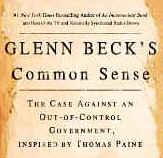  Common
Sense II - This
is the second in a multi-part review of Glenn
Beck's Common Sense. I really should be doing my taxes, but,
heck, I still have almost a week to get them done! Common
Sense II - This
is the second in a multi-part review of Glenn
Beck's Common Sense. I really should be doing my taxes, but,
heck, I still have almost a week to get them done!
 III.
The Political Weapon of Choice: The U.S. Tax Code
III.
The Political Weapon of Choice: The U.S. Tax Code
Complaining
about the tax system is almost . . . well, American! Doing
something about it, on the other hand, seems well nigh
impossible. Beck recites the well-known abuses of the system -
it is too complex and it is expensive to comply with. And, of
special hypocrisy, are the tax problems top Obama Administration
advisors (Geithner,
who got in as Treasury Secretary, and Daschle,
who didn't get in as HHS Secretary), as well as the top tax-writer in
Congress (Charlie
Rangel). Why is this? Beck's observation is the system
is so convoluted because politicians want to reward friends and punish
enemies.
Beck notes that if we had to pay our taxes
in-kind, we'd have rebelled a long time ago. He muses about
Thomas Sowell's idea that we should make election day April 16, the
day after tax day. That might lead to a better system. I
also noted down this quote from George Washington, which I thought was
great - "Government is not reason . . . it is force."
I wish more people would see it that way, too.
 IV.
The Perk and Privileges of the Political Class
IV.
The Perk and Privileges of the Political Class
Beck
is especially critical of Congress, and with good reason. While
they say they represent the people, their salaries place them in the
top 5%. And, while the public approval rating for them is
abysmally low, their re-election rates are astronomically high.
How is that? Well, they rig the system to insure their
continuation in power. As noted in the previous chapters, they
use the tax system to reward friends. They also establish
sometimes convoluted Congressional districts, through the
gerrymandering process, that insures political party stability.
And, while we don't have royalty in the U.S., there has risen up a
distinct political royalty - e.g., the Kennedy and the Bush families.
While politicians promise ethics,
transparency and accountability, they only deliver on increasing their
control over our lives. I agree with Beck that "all
governments are fascist in nature." That is, they all look
for ways to expand their power and control. Our founders set up
a system of limited government, but politicians have successfully
chipped away at that ideal for two hundred years. How can we
return to those principles? Beck argues that the bottom line is
that we must have term limits for all political offices. It is a
simple idea, and it tends to appeal to the typical voter. Maybe
it will actually work. But, I'm not holding my breath on this
one.
|
|

|
|
Friday,
April 23, 2010
 Free
(Market) Health Care
- The local paper ran
a story about a freshman student at NAU that required expensive
tests and surgery while being uncovered by any insurance.
Presumably, this was meant to show how bad the system is, and how much
better it will be with under the reforms recently passed. It
quickly prompted me to pen a letter, which ran in the paper
today: Free
(Market) Health Care
- The local paper ran
a story about a freshman student at NAU that required expensive
tests and surgery while being uncovered by any insurance.
Presumably, this was meant to show how bad the system is, and how much
better it will be with under the reforms recently passed. It
quickly prompted me to pen a letter, which ran in the paper
today:
|
To the
editor:
The recent
front page story about the ordeal of a young NAU student in
needing some some serious, and expensive, health care when she
doesn’t have insurance coverage illustrates what’s wrong
with our current system: government rules that stymie
competition and tie health insurance to a job. A better
system, and one that certainly would have benefited Ms.
Bacigalupo, would be a free market.
Why?
Well, in a free market, where insurance wasn’t mandated
through employment, she not only would have found it easier to
shop around for insurance, but being in about the lowest risk
pool imaginable (young), it would have been relatively
inexpensive.
If we can
end the nonsensical insurance coverage of regular medical
care, like for routine doctor visits and shots, she would only
have to buy the health insurance she really needed -
catastrophic coverage. This would also tend to keep her
costs low. Maybe even lower than someone her age buying
auto insurance. Over time, with a health savings
account, she could save money to provide for health care
between these two extremes, further keeping her actual
insurance costs down. Indeed, if her parents could have
done this, and if such an account were transferable to their
children, they might have had the wherewithal for the health
care needed now.
The better
system has more competition and more freedom, not more
government regulation, more government intervention and more
government mandates. Yet, the so-called “reform”
enacted by Congress moves us further away from a better
system.
Dennis Foster
Flagstaff, AZ |
The editor had written that he wasn't running many letters criticizing
the health care reforms because he just wasn't getting any.
Maybe I'll start writing on this topic more regularly.
|
|

|
|
Friday,
April 30, 2010
 We
Don't Need No Stinkin' Mules
- The National Park Service is considering dramatic changes in
allowing mule riders into the Grand Canyon. I attended a scoping
session last year and wrote a
blog on the topic. At the time, I was quite sure that
officials were looking for ways to reduce the number of mules in the
canyon. And, so it is. The park issued an Environmental
Assessment this past March. In it, their "proposed
alternative" calls for reducing mule riders traveling along the
Bright Angel trail by some 75%. They proposed to totally
eliminate the day trips to Plateau Point, and reduce, by half, the
number of riders allowed to go to Phantom Ranch (from 20 to 10).
As the editor
of the local paper wondered, why allow any? Why,
indeed? Well, I have been planning on penning a letter, or even
trying for an editorial on this topic, but wanted to do so before the
close of public comments. Alas, that is today. So, I did
go to the Park Service site and submit a comment electronically.
Perhaps, I'll get a chance later to send something to the paper.
Here's my beef: We
Don't Need No Stinkin' Mules
- The National Park Service is considering dramatic changes in
allowing mule riders into the Grand Canyon. I attended a scoping
session last year and wrote a
blog on the topic. At the time, I was quite sure that
officials were looking for ways to reduce the number of mules in the
canyon. And, so it is. The park issued an Environmental
Assessment this past March. In it, their "proposed
alternative" calls for reducing mule riders traveling along the
Bright Angel trail by some 75%. They proposed to totally
eliminate the day trips to Plateau Point, and reduce, by half, the
number of riders allowed to go to Phantom Ranch (from 20 to 10).
As the editor
of the local paper wondered, why allow any? Why,
indeed? Well, I have been planning on penning a letter, or even
trying for an editorial on this topic, but wanted to do so before the
close of public comments. Alas, that is today. So, I did
go to the Park Service site and submit a comment electronically.
Perhaps, I'll get a chance later to send something to the paper.
Here's my beef:
|
I wish to
offer some comments on the proposed changes to Mule Operations
at Grand Canyon National Park.
The stated
project objective is to provide “opportunities for mule …
use in Grand Canyon National Park to as large a cross section
of visitors as practicable,” and that this proposal should
be consistent with providing “access appropriate and
consistent with the character and nature of [Grand Canyon] and
the desired visitor experience.” (p. 8)
The
proposed alternative fails to live up to these objectives.
Equating visitors who ride mules on the rim to visitors who
ride mules into the canyon is untenable. The proposal
must justify such a conclusion. Visitors are clearly
interested in riding mules into the canyon, and much more so
than riding mules along the rim of the canyon. While the
latter may also be desirable, and the park service should have
been open to offering visitors such an experience, it should
not come at the expense of the historic use of trails to allow
visitors the opportunity of seeing the Grand Canyon from below
the rim.
The
proposal basically equates apples with oranges, by comparing
the number of mule riders that currently go into the canyon
with the number that would be allowed to ride along the rim.
I have hiked in the canyon for more than thirty years, and in
talking with mule riders, there is one unmistakable reason
that they are there – to ride a mule into the canyon.
This is the visitor experience that you are destroying with
this proposal. This abjectly fails to comply with the
objectives stated in the document.
I believe
that it would be in the best interest of the park, and it
would best serve the interest of the visiting public, to
continue allowing mule rides to Plateau Point and to maintain
the level of visitors riding to Phantom Ranch.
The issue
of the cost of trail maintenance is poorly addressed in the
document. It is clear that the Park Service had not had
a consistent policy in how to maintain trails. That is,
the trails are not maintained for continuous mule use, nor
strictly for hikers. As a consequence, monies have been
wasted over the years building the trail to a specification
that doesn’t meet the needs of either group. We can
see by the long-lived Grandview and Hermit trails what must be
done to insure that trails don’t deteriorate over time with
heavy mule use. But, the Park Service has refused to
maintain trails in this manner.
In 1924,
the Park Service built the South Kaibab trail from scratch for
$70,000. Using available inflation data, that would
translate into about $1 million today. Yet, the park
maintains that it has a $24 million backlog of trail
maintenance. That would be like building, from scratch,
24 South Kaibab trails. That is unbelievable.
At Bryce Canyon, there are
trails that are dedicated just to mules and horses. Why
not allow this at the Grand Canyon? Why not allow a
concessionaire to build a new trail into the canyon that they
would own and operate just for mule use? That would
resolve this issue, although private property is not a phrase
that exists within the National Park’s vocabulary.
Dennis Foster
Flagstaff, AZ |
I
should note that there aren't any mules currently going to Plateau
Point. Those rides were "temporarily" discontinued
while trail work continues on the South Kaibab trail. That work
shut down that trail to mule traffic and is expected to last a couple
of years. [Yes, longer than it took to build the trail in
1924!] Consequently, all Phantom Ranch mule riders are coming
back up the Bright Angel trail, and all the pack trains, hauling
supplies to Phantom Ranch, are going down, and coming back up, on the
Bright Angel. So, with all that traffic, the day trips to
Plateau Point have been dropped. This proposal would make that
change permanent.
|
|

|
|
Friday,
May 14, 2010
 Immigration
Idiocy - The
illegal immigration law that was recently passed by the state
legislature has raised complaints from the usual suspects - those that
can't read, or won't read, and want to put all issues into the
framework of race. Unfortunately, that included the esteemed
members of the Flagstaff City Council who are clueless when it comes
to understanding the proper role of government. Also clueless is
the Faculty Senate at Northern Arizona University. But, that's
nothing new. So, can it be of any surprise that they voted
overwhelmingly to condemn this new law, and characterized it (the
law) as racist? No. So, I penned this retort to this
action, which ran
in the paper this past Tuesday: Immigration
Idiocy - The
illegal immigration law that was recently passed by the state
legislature has raised complaints from the usual suspects - those that
can't read, or won't read, and want to put all issues into the
framework of race. Unfortunately, that included the esteemed
members of the Flagstaff City Council who are clueless when it comes
to understanding the proper role of government. Also clueless is
the Faculty Senate at Northern Arizona University. But, that's
nothing new. So, can it be of any surprise that they voted
overwhelmingly to condemn this new law, and characterized it (the
law) as racist? No. So, I penned this retort to this
action, which ran
in the paper this past Tuesday:
|
To the
editor:
What
lessons do we draw from noting that polls show 70% of
Arizonans support the new immigration law and that 70% of
Americans support the intent of this law, while about 90% of
the NAU Faculty Senate oppose this law? I suppose that
it is obvious. The NAU Faculty Senate clearly lacks
diversity. It also lacks common sense. It also
lacks any pretense to intellectual inquiry.
When we
add in the fact that this fringe group not only opposed this
law, but also declared that it was “racist,” then we can
be sure that they also have no intellectual honesty. No
wonder there are so many that look at the university with
disdain. Certainly, if the level of education that its
students are receiving is correlated with this vote, the
taxpayers of Arizona are being cheated.
On the
other hand, we should all applaud President Haeger’s
thoughtful remarks on this issue and encourage a more reasoned
debate. It would be better if opponents worked at
resolving the fundamental problems here rather than resort to
hate speech. I, for one, oppose both substantive
immigration controls and the welfare state that distorts
people’s actions in this regard. And, if I can use the
Faculty Senate’s own twisted logic, if you don’t agree
with me, you must be a racist.
Dennis Foster
Flagstaff, AZ |

Most
of the web comments, both to the original article and to my letter,
agreed with my basic contention. Indeed, I don't think you can
find a better example to illustrate the shallowness of the Faculty
Senate than to go out to their website.
On the right-hand side, you'll see a virtual suggestion box.
Upon a moment's reflection, you will note that it is, in fact, a
shredder! So, that's where all the good ideas go. Another letter
ran today, also critical of the Faculty Senate, where the writer
chastised them for this "[g]reat exercise in critical
thinking."
|
|

|
|
Friday,
June 18, 2010
 Atonement
and Fear - The
oil spill in the Gulf of Mexico has generated lots of heat, but little
light. The Congress had Tony Hayward, the CEO of BP
(formerly British Petroleum, but, apparently, now just "BP")
testifying yesterday on Capitol Hill. In the grand scheme of
things, it is useful to put BP's feet to the fire and do some
investigating. But, having Congress do this is . . . well,
totally bizarre. But, the whole event reminded me of something
that Fox
News Channel's Judge Andrew Napolitano always likes to say: Atonement
and Fear - The
oil spill in the Gulf of Mexico has generated lots of heat, but little
light. The Congress had Tony Hayward, the CEO of BP
(formerly British Petroleum, but, apparently, now just "BP")
testifying yesterday on Capitol Hill. In the grand scheme of
things, it is useful to put BP's feet to the fire and do some
investigating. But, having Congress do this is . . . well,
totally bizarre. But, the whole event reminded me of something
that Fox
News Channel's Judge Andrew Napolitano always likes to say:
|
When
governments fear the people, there is liberty. When the people
fear the government, there is tyranny. |
He attributes this to
Thomas Jefferson, although there is more than a little dispute
on that accord. Jefferson probably would sympathize with the
sentiment, even if he never actually uttered/wrote those words.
Anyway, I was thinking of this quote as I was watching Hayward
testifying. It seemed to me that he had the look of fear on his
face. As if the explosion of Deepwater
Horizon oil rig isn't going to cause BP enough pain and suffering,
he knows that our government can completely ruin him. So, he
comes to the Congress, with hat in hand, head bowed before the
almighty "representatives of the people," to atone for his
sin - he runs a big oil company - and beg forgiveness. Clearly,
he is sorry about the accident. How can he not be? And,
clearly, he wants to find out why it happened so that they can take
steps to reduce the likelihood of it happening again. That's
just prudent behavior. And, clearly, he accepts that BP will
have to pay out lots of money to those that were harmed by this
accident.
But, in an era where the government can take over banks and car
companies, it surely looks like BP is poised on the brink of a
different abyss. One where the government imposes so many
penalties upon them that they must fail. At least, fail insofar
as being a privately-held company. I can far too easily envision
a future where the federal government is the major stockholder in
BP. And, that is chilling. Or, worse - tyranny.
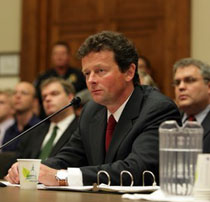 |
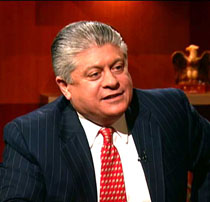 |
 |
Tony Hayward,
CEO of BP,
testifies before Congress. |
Judge Andrew
Napolitano, not to
be confused with our ex-governor. |
Thomas
Jefferson, to whom the quote is often attributed. |
I suppose it was too much to hope for that Hayward would go to
Congress and "give 'em hell." But, that's just not in
the cards these days. If he spits in their eye, they'll just
rake him over the coals and then take his company. I am reminded
of some of the capitalists in Ayn Rand's Atlas
Shrugged that don't hold back in criticizing the government for
its regulation and control of business. Where are these
capitalists today?
Still, I must admit that I am getting a little satisfaction from BP's
squirming. They have been a leader in cozying up to the green
movement and embracing the whole global warming nonsense. And,
they have contributed
more to President Obama's campaign than they have to any other
politician in the last thirty years. So, if they do some
twisting in the wind over this oil spill fiasco, I'm not going to be
too sympathetic to their circumstances.
|
|

|
|
Tuesday,
June 29, 2010
 Fire
as Failure - Over
Father's Day weekend we had two big fires in Flagstaff which attracted
quite a bit of national attention. On Saturday (the 19th), the Hardy
Fire was started about a mile from my home, although I don't think
that it would have spread this far through residential areas.
Still, a local hotel (Little
America) was evacuated, and we received a robo-call from the
county that we should be ready to evacuate as well. That fire
was started by a Fire
as Failure - Over
Father's Day weekend we had two big fires in Flagstaff which attracted
quite a bit of national attention. On Saturday (the 19th), the Hardy
Fire was started about a mile from my home, although I don't think
that it would have spread this far through residential areas.
Still, a local hotel (Little
America) was evacuated, and we received a robo-call from the
county that we should be ready to evacuate as well. That fire
was started by a 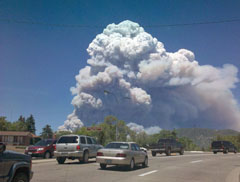 transient,
which is pretty much an annual thing here in the early summer.
As such, there isn't much we can do about this problem except bear the
burden of fighting such fires. transient,
which is pretty much an annual thing here in the early summer.
As such, there isn't much we can do about this problem except bear the
burden of fighting such fires.
On Father's Day (the 20th), we had the much bigger Schultz
fire. It had erupted in a major way while we were having
lunch at a local restaurant. As we left, we drove up to Route
66, where I snapped the photo to the right when we were about a half
block from city hall. [No, I wasn't driving!] We drove on
up to McMillan Mesa, and parked in the lot of the USGS
office, where we 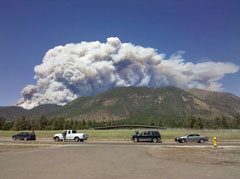 could
more clearly see the origin of the fire - in the pass between Mt.
Elden and the San Francisco Peaks. That is where I took the
picture to the left, showing the extent of the smoke pluming behind
Mt. Elden. [Click
on either photo to see a larger image.] could
more clearly see the origin of the fire - in the pass between Mt.
Elden and the San Francisco Peaks. That is where I took the
picture to the left, showing the extent of the smoke pluming behind
Mt. Elden. [Click
on either photo to see a larger image.]
This latter fire was started from campfire that was not properly put
out. It's still smoldering even now, nine days later. And,
it isn't surprising that the same old arguments are being made with
regard to what should be done to prevent this from happening again - (i)
increase education among campers, and (ii) close the forest during
peak fire season. The former is laudable, but doomed to failure,
while the latter is an abject indicator of the failure of the Forest
Service (and, by extension, the government) to adequately maintain the
environment.
We all know what must be done to prevent these fires - more monitoring
and/or development. But, without the budgetary resources to
accomplish the former, we end up with awful choices like "close
the forest down." Here are some better solutions . . .
 Provide
developed campsites. The
camping in this area is mostly "at large," although there
are some regular spots that campers use over and over. Maybe
some more developed camping areas (yes, for fees) would provide a
better opportunity for the clueless to experience the outdoors without
endangering everyone else.
Provide
developed campsites. The
camping in this area is mostly "at large," although there
are some regular spots that campers use over and over. Maybe
some more developed camping areas (yes, for fees) would provide a
better opportunity for the clueless to experience the outdoors without
endangering everyone else.
 Form
volunteer forest caretakers. We
mostly have this problem for only two months - May and June.
Following a decent winter, May isn't usually a problem. And, if
the rainy season starts on time, July and August are usually
better. So, why not form volunteer groups that drive along the
popular forest roads and take an inventory of campers in the evening,
and then return in the morning to insure that all campfires are put
out? I am sure that plenty of people would sign up for such a
group. They aren't out to harass, or confront, anyone - just to
make sure that nothing dangerous is left untended.
Form
volunteer forest caretakers. We
mostly have this problem for only two months - May and June.
Following a decent winter, May isn't usually a problem. And, if
the rainy season starts on time, July and August are usually
better. So, why not form volunteer groups that drive along the
popular forest roads and take an inventory of campers in the evening,
and then return in the morning to insure that all campfires are put
out? I am sure that plenty of people would sign up for such a
group. They aren't out to harass, or confront, anyone - just to
make sure that nothing dangerous is left untended.
 Revert
to logging the forest, even if on a lower scale than the past. One
thing we can be sure of - people (or, firms) with private property at
risk tend to take steps to reduce that risk. Suppose that a firm
had a contract to the timber in this area. Wouldn't they find it
in their best interest to provide the kind of monitoring necessary to
protect their interests? I should think so! But, the
politically correct way to think about this is that it is better to
let 15,000 acres burn up than it would be to harvest timber on, oh,
say 5,000 acres.
Revert
to logging the forest, even if on a lower scale than the past. One
thing we can be sure of - people (or, firms) with private property at
risk tend to take steps to reduce that risk. Suppose that a firm
had a contract to the timber in this area. Wouldn't they find it
in their best interest to provide the kind of monitoring necessary to
protect their interests? I should think so! But, the
politically correct way to think about this is that it is better to
let 15,000 acres burn up than it would be to harvest timber on, oh,
say 5,000 acres.
I don't really expect any of the above ideas to take hold, because
they go against the grain of sappy environmental thinking and the
unwillingness for any government entity to reducing its power and
authority. Indeed, the
local paper had a story about how a thinning project was to take
place along Schultz Pass in 2007. But, an environmental group
appealed the project, and it never got off the ground. Well,
it's thinned now! Too bad we can't sue these environmental
groups for putting us all at increased risk.
|
|

|

|

|

|

|